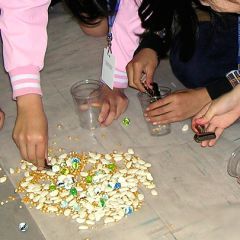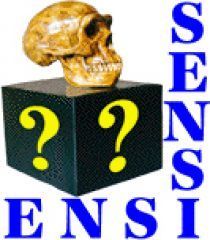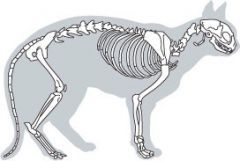Found 7 resources for the concept:
Different scientists may interpret the same data in different ways. (P7)
Clipbirds
Grade Level(s):
- 6-8
- 9-12
Source:
- UC Museum of Paleontology
Resource type:
- classroom activity
Discipline:
- Life Science
Time: one class period
Overview
In this activity, students simulate bird feeding with "beaks" that differ in size. The proportion of big-, medium-, and small-beaked birds changes in response to available types of food. This is a lesson on evolution, but suggestions on how to incorporate the nature and process of science are included.
Dino-Data
Grade Level(s):
- 6-8
Source:
- UC Museum of Paleontology
Resource type:
- classroom activity
Discipline:
- Earth science
- Life Science
Time: 3-4 class periods
Overview
Students examine data about dinosaurs and hypothesize about what the data can tell them. Students modify their hypotheses as more information is revealed and review what they have learned about how science works.
Dogs and turnips
Grade Level(s):
- 6-8
- 9-12
Source:
- UC Museum of Paleontology
Resource type:
- classroom activity
Discipline:
- General
Time: 30 minutes
Overview
In this lesson students attempt to assemble a meaningful sentence by successively turning over cards with words on them. The point is made that we change our ideas of what a story may be as we gather more information.
Galaxy classification
Grade Level(s):
- 6-8
- 9-12
Source:
- Whitfield, Lisé
Resource type:
- lab activity
Discipline:
- Space science
Time: One class period
Overview
This is a modified version of Galactic Inquiry in which students learn about galaxy classification while also experiencing a simple simulation of peer review and community analysis.
Introducing the Understanding Science Flowchart to middle school students
Grade Level(s):
- 6-8
Source:
- UC Museum of Paleontology
Resource type:
- classroom activity
Discipline:
- Earth science
Time: 1-2 class periods
Overview
Students read a story about Walter Alvarez and then plot his scientific journey on the Understanding Science Flowchart. Students find that science is seldom a linear story.
The great fossil find
Grade Level(s):
- 6-8
- 9-12
- College
Source:
- ENSI
Resource type:
- classroom activity
Discipline:
- Life Science
Time: one class period
Overview
Students are taken on an imaginary fossil hunt and form hypotheses about the identity of the creature they discover. Students revise their hypotheses as new evidence is found.
Xenosmilus
Grade Level(s):
- 3-5
- 6-8
- 9-12
Source:
- UC Museum of Paleontology
Resource type:
- classroom activity
Discipline:
- Life Science
Time: One class period
Overview
In this lesson, students play the roles of paleontologists on a dig. They "unearth" a few fossils at a time and attempt to reconstruct the animal the fossils represent.





